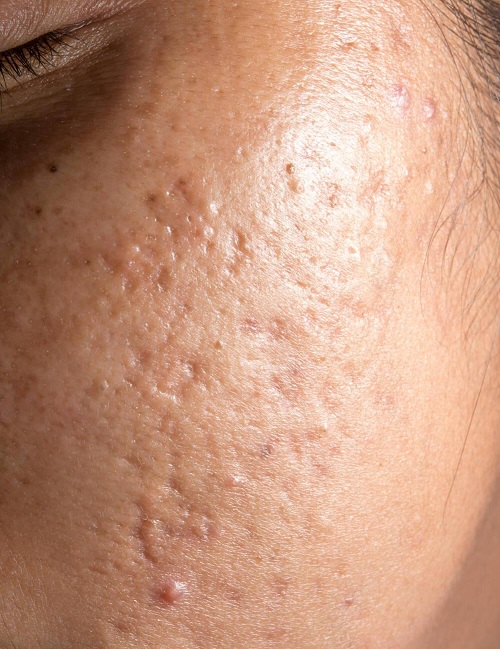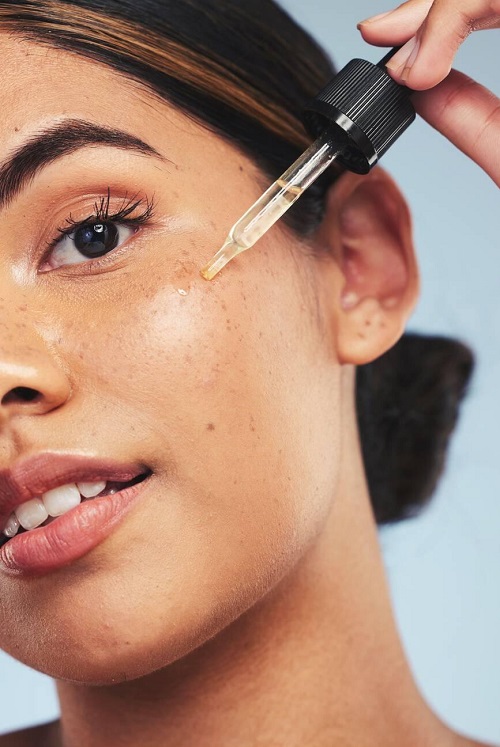Acne is a nuisance, and even more are the scars that follow! However, using olive oil for acne scars can work wonders!
Acne is a common experience for many of us, not just during our teenage years but often as adults, too. Typically, acne clears up independently, but it can leave behind a frustrating reminder—scars. These scars can significantly affect a person’s confidence and self-image. While we often turn to commercial or natural remedies to fade these marks, success isn’t always guaranteed. However, there’s good news about olive oil; it’s renowned for its skin-healing properties and might just be the gentle solution you need to help reduce acne scars.
What Causes Acne Scars?
Acne scars occur when severe acne breakouts cause deep damage to the skin and the tissue beneath it. As the skin heals, it tries to repair the damage by producing collagen, a protein that gives the skin its firmness and elasticity. If the body doesn’t produce enough collagen, pits or depressions form on the skin, creating what are known as atrophic scars.
On the other hand, if the body produces too much collagen, it can lead to raised acne scars, known as hypertrophic or keloid scars. These scars can differ in appearance and can be quite difficult to treat, which is why preventing acne and addressing breakouts promptly is important to avoid these long-term changes in skin texture.
Does Olive Oil For Acne Scars Actually Work?
Though oil cleansing might sound scientific, very little research has been done on this method. There have not been any large, randomized clinical trials testing this method on humans. However, the noteworthy fact is that people have been using olive oil for their skin for centuries. Among the little research that has been conducted on the benefits of olive oil, the results are mixed.
A 2012 study found that olive oil contains oleic acid, which supposedly weakens the skin barrier. People with eczema (atopic dermatitis) experienced mild irritation on their skin when olive oil was applied.
Another small study of around 28 university students found that olive oil, which has cleansing properties, is best for dry skin and also for aged skin, but people with oily skin should ideally not use olive oil as a cleanser.
Yet another study showed the direct antioxidant properties of olive oil, which could help prevent UVB-induced damage to the skin and potentially reduce the risk of skin cancer.
All in all, though olive oil may be effective in several cases, it will not work every time because for two reasons. The first one is that everybody’s skin is different, and often, the cause of acne is multifactorial. The latter means that you can’t always treat acne with only one product every time.
How Does Olive Oil Help With Acne Scars?
Following up on the discussion about the philosophy behind oil cleansing, the justification is that you do not want to clear your skin off all-natural oils as the dryness could send the sebaceous glands into overdrive, leading to a lot more oil production. And thus, the cycle of the pesky acne continues.
To avoid this, the oil cleansing method can balance out your skin, thus locking in moisture and the essential natural oils in your skin to keep it healthy while also getting rid of acne.
One of the most recommended oils for oil cleansing is olive oil because it is said to help people with almost all skin types and is high in vitamin and antioxidant content. You could also research using olive oil with other oils like grapeseed, almond, and castor. It isn’t recommended to use olive oil with coconut oil, though, and you would need to consult your dermatologist for this blend.
As mentioned, olive oil is lauded over other oils for oil cleansing and for getting rid of acne scars because of its potent antibacterial properties and vitamin-rich and antioxidant-rich nature. In the right combination, it can moisturize your skin and create a hydrating barrier that locks in the moisturization, too. This helps clear up your acne and makes your skin look healthier and more youthful.
Besides its anti-inflammatory properties, olive oil’s antioxidant content helps destroy free radicals in your skin that could be caused by harmful UVB-induced damage and, ultimately, protects your skin’s glow. For scars and spots caused by acne, you can use an olive oil routine to fight and remove the excess sebum (oil) in your face, stripping away excess sebum and leaving replenished, healthy skin underneath.
How to Use Olive Oil for Acne Scars?
Now that you have learned about the benefits of olive oil for acne scars, you might want to try it. If that is true, all you have to do is follow these simple steps:
- Have your olive oil ready or mix together olive oil along with other oils if you are following a particular recipe.
- Pour the oil or oils onto your palm according to the designated quantities, then apply it all over your face. Massage it into your skin for a few minutes using circular motions
- Allow the oil to sit on your face for a minute.
- Then, dip a washcloth in warm water, making sure it is warm enough to dissolve the oil but not burn your water. Hold the washcloth to your face for 15 seconds. Then, slowly start wiping off all of the oil until it is gone.
- Repeat these steps regularly but never more than once per day. It will be a couple of weeks before you start seeing results.
Tip: You could also try double cleansing, which entails cleansing your face twice in a row. First, you would cleanse with an oil cleanser and then with a regular water-based cleanser. People who believe in this cleansing method believe that it removes the oil and dirt build up on your face and gets rid of regular dust and sweat that your face may have accumulated throughout the day.
Do’s and Don’ts When Using Olive Oil For Acne Scars
Since olive oil is a natural ingredient, it should be safe for your skin unless you are allergic to it. Thus, you must first ensure that you do a patch test with either olive oil or all the oils from a recipe that you may be following. Wait for 24 hours to gauge if there is any allergic reaction.
You should also speak to your dermatologist before using olive oil for your acne scars because it may encourage more clogged pores and irritation.
When using the oil cleansing method, you must be careful when wiping your face with warm water, as there is a risk of burning your face if the water is too hot.
Wrapping Up
To reiterate, while olive oil may have worked for someone, it may not necessarily work for you and vice versa. Olive oil cleansing might help get rid of your acne scars or spots, but you have to be cautious about it making your acne problem worse.
This is why it is important that you proceed with caution and always use gentle soaps or mild water-based cleansers to remove the oil after massaging it into your skin.
Lastly, do not forget to discuss the cleansing method or the recipe you use with your dermatologist.



